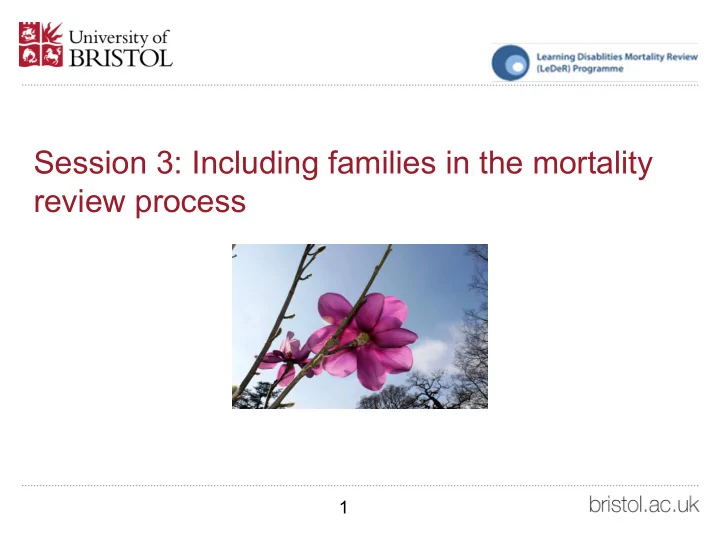

Session 3: Including families in the mortality review process 1
Sian Lewis Williams QPM National Family Liaison Advisor Security Marking
Recommendation 26 ‘ That the SIO and FLO be made aware of good practice and their positive duty shall be satisfactory management of family liaison, together with the provision to the victims family of all possible information about the crime and its investigation.’
FLO deployment criteria • An unexplained or violent death, particularly in respect of Homicide road death ; • And Mass disaster • Also other cases that do not involve a fatality where family liaison might enhance the effectiveness of the police response
FLO’S – who do they work for • SIO • SIM • Coroner • Foreign and Commonwealth Office • They will be managed and supported
Working with Families – what can they expect • THE PRIMARY ROLE OF THE FLO IS THAT OF AN INVESTIGATOR . • To provide information to and facilitate care and support for the family, who are themselves victims, in a sensitive and compassionate manner in accordance with the needs of the investigation • Day to day management of the partnership with the family in the investigation and close liaison with the SIO to ensure families are treated appropriately, professionally and with respect to their needs.
Working with Families – What can they expect • Providing the family with as full and up to date information as possible about the incident and its investigation. • Obtaining a full family background and other and other relevant details required by the SIO/SIM and coroner. • To gather evidence and information from the family in a manner which contributes to the investigation and preserves its integrity. • To secure the confidence and trust of the family thereby enhancing their contribution to the investigation
Working with the families • The FLO will record all contact with the Family in the FLO Log provided. These contacts must record an overview of the information disclosed to the family and any queries that the family raise . • To obtain a ‘Victim Impact Statement’ from relevant family members identified in consultation with the family and the SIO. • To assist in the identification of their loved ones. • To make the family aware of the identity of local and neighbourhood policing teams and help and support that can be offered
Working with families • Navigate the criminal justice process – statements – victims code of practice • Court visits • Coronial process • Other processes • Referral to other support agencies and consent • Media • Social media
Honest discussions • Human Tissue and Coronial process • Fact V Speculation • Realistic expectations about what is going to happen • Property – return • Family dynamics – being honest • Good working relationships/Common Goal (look after families in a sensitive compassionate manner)
Family Liaison and Record Keeping • FLO log books • Major Incident Room • SIO updates and briefings • Disclosable documents • Statements/Special Measure requests/Human Tissue forms/return of property forms – how this effects families and the honest conversation around these issues.
Working with families •Any questions
Contact Details Sian Lewis Williams QPM National Family Liaison Advisor Major Crime Investigative Support National Investigative Capabilities Specialist Investigations | Investigations Command Tel: Mobile: +44 (0)7990 081007 Major Crime Investigative Support: 0345 000 5463 Email: sian.lewis-williams@nca.pnn.police.uk Sian.lewis-williams@nca.x.gsi.gov.uk www.nationalcrimeagency.gov.uk
Sian Lewis Williams QPM National Family Liaison Advisor Security Marking
Support for staff • Health and wellbeing is paramount • Healthy and well supported staff = better quality investigations and ultimately quality family liaison • Supported through the investigation – role of co-odinators and SIO’S (recognising the stress that FLO’S face when dealing with trauma) • De-briefed daily • De-briefed at the conclusion of the investigation • Exit of FLO from investigation formally and informing families of the conclusion of the deployment • Open relationship with their co-ordinators • Record of deployment – deployment database
Support for staff • Recorded referrals to Occupational health – locally different – mandatory referrals for some forces • Record of any associated risks and overcoming challenges • Accepting feedback and managing feedback • Regular CPD events • Engagement with local supervisors to ensure workload is manageable • What do you do with staff that fail or refuse to engage with regular referrals to Occupational health or other associated support networks • KNOW YOUR STAFF
Support for staff •Any Questions
Recommend
More recommend